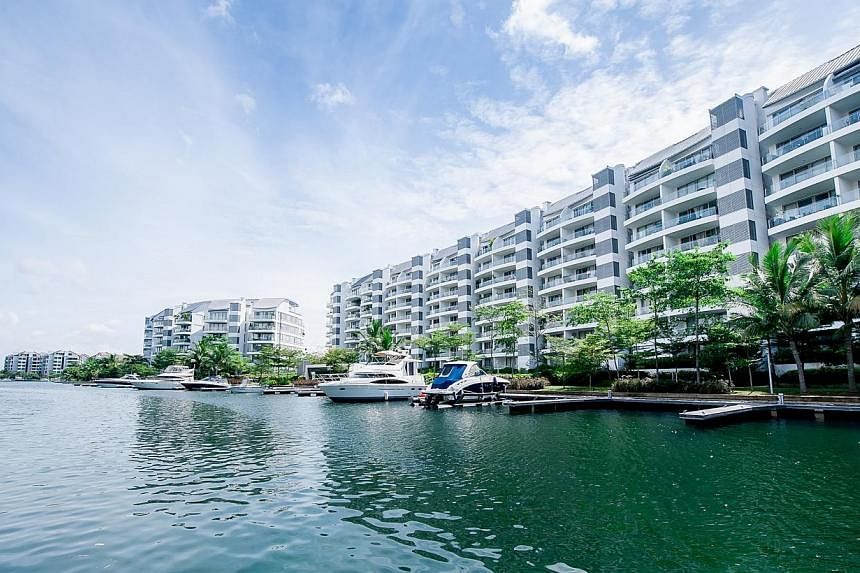SINGAPORE (Reuters) - There's an eerie silence at night in Sentosa Cove, the man-made island resort billed as Singapore's answer to Monte Carlo and the only place in the country where foreigners can buy landed property.
Dozens of houses - complete with their own private yacht berths and multiple swimming pools - sit empty while few lights are on in the apartment blocks overlooking the marina, a few kilometres away from Sentosa's giant casino.
Prices in the gated community, where Australian mining tycoons Gina Rinehart and Nathan Tinkler bought properties, fell around 20 per cent in the past year as lending restrictions and taxes on foreign buyers burst a bubble in the Southeast Asian financial hub's luxury real estate market.
Investors could see the value of their assets fall even further with developers and investors still struggling to sell even after the recent price falls. Real estate websites list hundreds of flats and bungalows for sale, yet just 12 apartments and one house have changed hands all year on Sentosa, according to data from the Urban Redevelopment Authority (URA).
"The way prices have fallen in Sentosa, it's as if there is a global financial crisis," said Alan Cheong, head of Singapore research at property firm Savills.
That could mean a tough 2015 for the city state's banks unless policy restrictions are eased soon. But that looks unlikely because government-imposed curbs are having the desired affect of keeping the broader market in check after private house prices rose more than 60 percent between 2009 and 2013.
New mortgage business at the country's lenders is up to 40 per cent below 2013 levels, although the downturn is unlikely to show up in their balance sheets until next year as loans are typically agreed a year ahead of them starting to be drawn down.
Compounding the problem for property investors are cutbacks in housing allowances for expatriate workers - meaning rents have fallen - and a drop in the number of high-net-worth foreigners being granted permanent residency.
Estate agent Knight Frank's analysis of property prices in 32 cities around the world found Singapore's prime residential market, defined as the priciest 5 per cent of properties, performed the worst in the first half of 2014, with prices falling 7.3 per cent.
For the luxury sector, the government measures have led to a sharp drop in foreign buyers, who accounted for over half of Sentosa sales between 2010 and 2014.
That means the number of distressed investors is expected to rise. "Some of the earlier buyers are likely to have bought at prices 20 to 30 per cent above current prices," said Christine Li, head of research at property consultancy OrangeTee.
"The rental can't even cover the mortgage for these high-end investments - they want to offload but there are no takers."
United Overseas Bank, Singapore's third-biggest lender, last month reported a doubling in its bad debt charges for the second quarter, saying a group of investors was struggling to service high-end property loans.
The number of residential properties being put up for sale at auction by banks after buyers defaulted on mortgages, known as mortgagee sales, quadrupled to 64 in the first half of this year from 16 in the second half of 2013, according to real estate agency Colliers.
"This is different from previous years, when owners' sales dominated auctions," said Joy Tan, head of auctions at DTZ. "The tables have turned and we expect more mortgagee sales on the way."
In July, a four-bedroom apartment in Sentosa's Turquoise condo sold at auction for $3.88 million in a mortgagee sale, or about $1,400 per square foot. In 2012, a flat in the same block sold for $2,450 per square foot and in 2007 for as much as $2,800.
The only house that has sold on Sentosa all year - a six-bedroom pad on "Treasure Island" - went for $17 million in February, having been bought for $20.2 million in June 2012.
Some in the luxury property industry fear foreign buyers have gone for good.
City Developments, Southeast Asia's second-largest residential property developer, said in its latest results statement that foreign buyers have "shifted and are still shifting their investments to markets outside Singapore".
Sentosa Cove was developed in the early 2000s at a time when Singapore was actively courting the world's wealthy to its shores. It sprang up along with other luxury developments near Singapore's glitzy Orchard Road shopping district.
In 2004 the country's central bank launched the Financial Investor Scheme (FIS) that allowed foreigners with a global net worth of $20 million to become permanent residents if they parked $5 million in Singapore, $2 million of which could be put into property.
That scheme, a favourite tool of Singapore private bankers to win clients, was quietly scrapped in 2012 as the government grappled with growing public discontent over immigration, rising inequality and a spike in property prices, adding to the drop in wealthy foreign property buyers.
While Singapore is trying to tone down its image as a place where residency is "for sale", Australia is embracing a similar scheme, luring away some of the high-net-worth buyers.
That, combined with the end of the "easy money" seen before the 2008 financial crisis, may mean the quiet on Sentosa Cove's streets is here to stay. "Sentosa happens to be a development targeted at a time when the world was leveraging up but now that we have deleveraged, there is a much smaller pool of people who can afford it," Savills' Cheong said.

